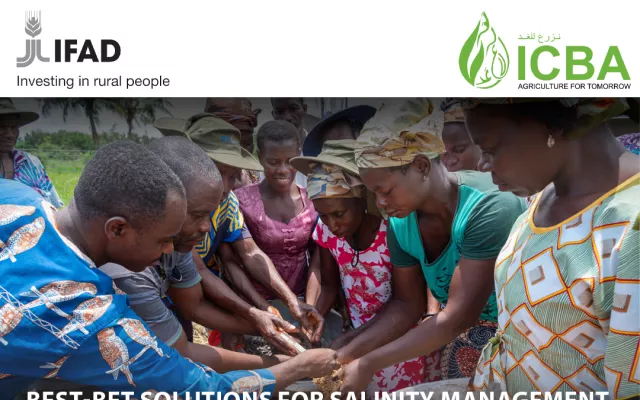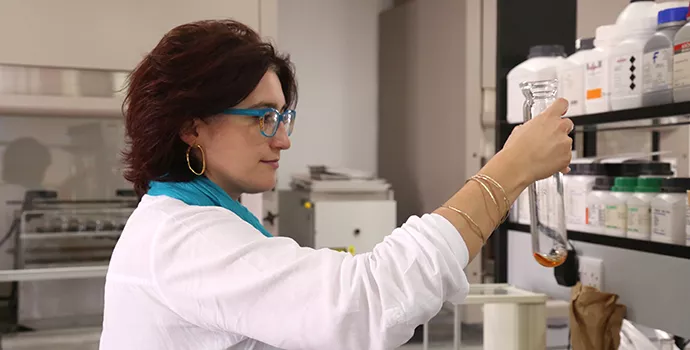Helping women realize full potential in farming and science
6 October 2016
Agriculture is an engine of growth for rural communities, particularly in the developing world. It has also proven to be an especially viable tool for women to lift themselves out of poverty. Women in developing countries rely heavily on the income they earn from agriculture-related activities to provide for their families and as a source of increased autonomy. In least developed countries, 79 percent of economically active women report that agriculture is the primary source of their incomes and agriculture is the single most important source of employment for women in Africa and South Asia.
In addition to providing women with an income stream, agriculture is an essential component of rural food security. While, clearly, women do engage in paid work - so much so that they make up an estimated 43 percent of the agriculture-based workforce in some countries - much of their duties are unpaid. These responsibilities cover a broad range of household and farm tasks including crop production, food preparation, tending to livestock, collecting water, caring for children, and managing the home. These duties often prevent women from fully embracing new agriculture techniques which may be time- or labor-intensive. Women are also more likely to take part in unpaid, seasonal, and part-time work, and they are often paid less for their work compared to men.
Whether they do paid or unpaid work, women’s contribution is critical to their communities. However, they face hurdles to access methods of agricultural development, such as training, inputs, and land. These barriers not only prevent women from reaching their full potential but also cost their communities. The FAO estimates that if women were to have the same access to resources as men, agricultural yields could increase by as much as 20-30 percent, with the potential to reduce food insecurity for an astounding 100-150 million people globally.
A greater inclusion of women in agriculture, both in production and decision making, can reduce food insecurity, contribute to rural livelihoods, and drive economic development. Inclusion means creating employment opportunities for rural women, advocating for policy that takes the specific needs of women into consideration, and providing business and legal education to women.
In recent years, the International Center for Biosaline Agriculture (ICBA) has increased its efforts to empower women, especially those engaged in farming and science, and partnered with national, regional and international organizations to address challenges they face.
For example, a 2015 joint initiative in Uzbekistan between ICBA and the International Center for Agricultural Research in the Dry Areas (ICARDA) highlights how education can create more opportunities for women.
Agriculture in Uzbekistan accounts for a little more than 18 percent of the country's GDP and is a significant source of income for much of the country’s rural population. However, rural communities face a number of threats to their agriculture-based livelihoods due to land degradation, including soil salinity and mineralization, especially in regions adjacent to the Aral Sea. The limited amount of arable land, combined with degradation, means that farmers often have trouble growing traditional crops, including food sources for their livestock. The joint research effort between ICBA and ICARDA looked for ways to manage low-quality land and the potential of non-conventional crops to serve as livestock feed.
Findings from this research were shared through a series of field training seminars, helping to establish the Rural Women Learning Alliance. The alliance, which is made up of about 45 women and led by a local woman farmer, is the first of its kind to work with women looking to diversify their incomes. This work shows how education and training can serve as a catalyst for women-driven collaboration and leadership.
Another project led by ICBA, which looks to combat soil salinity in Ethiopia and South Sudan, hopes to have a similar impact on the opportunities and livelihoods of rural women. “We plan to develop strong linkages between smallholder farmers, rural producers, and different extension and research organizations,” Dr. Shoaib Ismail, Director of the Research and Innovation Division at ICBA said about the project. He went on to explain that strategies identified through the project would increase farmers’ incomes and improve livelihoods of poor rural communities, especially women.
It is not enough, however, to just work with women farmers. The need for women scientists to not only serve in research roles, but also as decision makers and leaders, is increasingly being recognized. Prof. Londa Schiebinger, a Stanford science historian and project director of Gendered Innovations, stresses the need to take gender into account when conducting research. A gendered approach includes increasing the number of women that take part in scientific discovery, enacting structural change to support gender equity at all levels of scientific institutions, and integrating a gendered dimension into research. After all, when women take part in the scientific process, they are more likely to address the issues that women face.
Similarly, Dr. Wanjiru Kamau-Rutenberg, speaking at the 2015 Borlaug Dialogue, underscored the need for more women leaders in agricultural research institutions. “We also need to transform the landscape when it comes to research and development,” she said. “It is really important that we have both men and women setting the research agenda.” The solution to increasing the number of women in leadership roles, though, is not as simple as just hiring more women scientists. Entry-level women scientists will need strong mentors along with opportunities to build their networks and develop their skill set.
In the Middle East and North Africa (MENA), where the percentage of women employed in agriculture-related activities has risen from 30 percent to nearly 45 percent since the 1980s, women are playing an increasingly important role in the scientific community. According to UNESCO, the number of female students pursuing science, technology, and innovation (STI) studies continues to increase. Despite these advances, however, women in the region remain underrepresented in management and other senior roles.
To tackle this issue, ICBA launched in August 2016 the design phase of the Young Arab Women Scientists Leadership (Tamkeen) Program. Funded by the Islamic Development Bank (IsDB) and the Bill & Melinda Gates Foundation, the design phase will lay the groundwork for the Tamkeen program, the first of its kind in the Middle East and North Africa (MENA) region. The program aims to improve leadership opportunities, provide peer and mentor relationships, and contribute to the long-term goal of increasing women-led research into improved food security.
A similar program is the Young Arab Women in Agriculture Science (YAWS). A joint venture between ICBA and CRDF Global, YAWS is a competition which seeks to engage women in long-term scientific research by fostering collaboration among Arab and U.S. scientists. Together, these programs seek to not only support women-led contributions to the agriculture sector, but to provide them with the tools and networks to steer the development conversation.
Women-led contributions to agriculture, both on the farm and in the lab, are essential components of global food security and rural livelihoods. Programs, like those led by ICBA and their partners, are important methods of reducing structural causes of gender inequity and encouraging women to take an active role in future scientific developments. As Ms. Michelle Bachelet, former Under-Secretary-General and Executive Director of UN Women, said: "When women are empowered and can claim their rights and access land, leadership, opportunities, and choices, food security is enhanced and prospects are improved for current and future generations."










